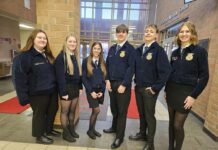“I always like to fetch the cows, because it makes such a pleasant walk at the two best times of the day. The dogs always enjoy it so much, and so did Peggy’s small niece, when she was visiting us. I like to see the condition of the pasture, and to make mental notes of odd little jobs of fence repairing, or weed cutting, or brush gathering, waiting to be done. There is always something nice to watch, like a rabbit making fun of the dogs, or a covey of quail taking off like a squadron of planes, or an exquisite little skunk driving the dogs crazy, or a long black snake going his own mysterious way.”
– from RFD by Charles Allen Smart, 1938
One of my first jobs on our family dairy farm was to help bring the herd in from the big pasture. It never felt like a job and sometimes I would hurry the day a bit by trying to get the cattle in all by myself.
Stock cane. I remember feeling like such a big shot, opening gates and hiking through the smaller pasture as I made my way down the hill toward the large pasture.
I held that old stock cane with bursting pride, a symbol of my authority at the ripe old age of 8 or 9.
There were days the cattle were eager to get in to a shaded barn, and those were the trips that just really were not all that much fun for me.
What I liked best were the days that the pasture was ripe and lush with green grass and cool breezes, the cattle spreading out hither and yon in a pasture the size of Texas, paying no attention to me whatsoever.
Playing cowboy. It was on those trips out to the big pasture that I felt like a cowboy on the open range, and I was one lucky duck to have a great dog named Bill as my right-hand man.
Together, we were up to the challenge. We even welcomed it.
Bill was an English Shepherd, often referred to as a farm collie on many working farms and he had the remarkable instincts of the great herding dog that he was bred to be.
If the cattle were moving, responding to my presence (and I felt sure my presence was made much more magical simply by holding that mysteriously wonderful stock cane in my hand), then Bill would stay near my side, pretending to just be kindly tagging along for a walk.
Help from Bill. But on the days that the cattle seemed stubborn and free-spirited, Bill’s ears perked up, his eyes darted across the pasture and he sprung in to action, circling in a wide arc out across the borders, urging the herd to move.
Always, always, the elder statesman of the Holstein herd, the noble No. 48, who we called Linda, walked to the far corner of their allotted universe. She walked on what appeared to be very sore feet, and she took her sweet time.
No matter what the weather, no matter how late or how early we went for her, she didn’t move until we cajoled her in to moving.
Respect. Bill sensed Linda’s place in the herd and he was amazingly respectful of her lack of steam as she made her way up the hill toward the milking parlor.
On the other hand, let a young heifer or two attempt to pull this same manner of moving and Bill would nip their heels and send them packing.
Once in a while, a heifer would surprise us by giving birth to a calf out in the pasture. The first time this happened, I wasn’t sure what to do, as some of the cattle wanted to stay and gape at the newborn.
Eventually, I learned to tell Bill to stay with the mama and baby, and he would help me urge the curious cattle onward. Dad would go for the calf and bring it in to the barn.
Thrills. No matter how many newborn calves I had seen, the thrill never went completely away and I remember taking several long looks back as that clumsy newborn calf attempted to stand on amazingly wobbly legs.
I remember the thrill I felt when I would see strangers’ cars stop on old Route 30, sometimes a passenger jumping out to take a picture. I felt a measure of owners’ pride, a momentary knowledge of making someone’s day with our own little miracle on our own little farm.
Keep working. But that magical stock cane reminded me there was work to be done, no time for contemplating new arrivals or city folks with curious camera lenses.
It was time to close some gates, draw buckets of hot, soapy water and get on with the real work of the day.
The fun was over. It ended when the stock cane was placed on its hook. But there was always the next time.











